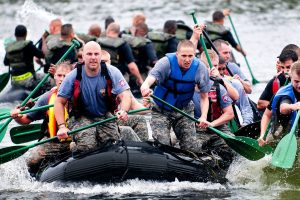
Military Nurse
Nursing is one of the most rewarding careers you will ever experience. Becoming a military nurse offers additional benefits and rewards over and above a traditional nursing career. Military nurses have more options for traveling and can actually work as medics in the field, providing an opportunity to work in a fast-paced and very unique environment. Military nursing prepares you for high-stress situations such as trauma and emergency room care.
What Is a Military Nurse Job Description?
Military nurses are medical professionals and also soldiers. While some work in hospitals on base, others work on the front lines offering medical assistance to those injured during combat. Military nurses receive specialized training. They can work under pressure and provide the best possible care with whatever tools and resources are available. Military nurses are active members of the military and often make it a lifelong career.
Military nurses work in every military branch: Air Force, Marines, Army, Navy, and Coast Guard. They Navy, for instance, has the Navy Nurse Corps. They are military personnel and live a military life. But unlike traditional registered nurses or civilian nurses, they must be ready to go to war like other military personnel.
After discharge, many military nurses work in hospitals as emergency or trauma nurses or as paramedics and EMTs. The skills and training they receive during their military career help them to function efficiently in areas where quick thinking and fast action are a must. Military nurses are skilled in triage and moving patients. This combination makes them ideal for working on ambulances and as flight nurses who care for patient transport.
Military Nurse Job Duties
A military nurse performs the same duties as a non-military nurse. They care for patients, dispense medications, and work with doctors, assisting them with their duties. A military nurse works in hospitals on a military base or in small medical clinics located in areas near the front lines and all locations in between. This is where they offer the same types of medical care as a non-military registered nurse, from basic life support to assisting surgery.
A military nurse has the skills and training to work in a military environment. That may mean military hospitals. It may mean the battlefield. They have the ability to assess, stabilize, and move patients during stressful situations while at the same time taking precautions to protect themselves and others. Additionally, military nurses can work in a stable environment as well as a hostile one. Thus, they are trained as soldiers and also have the ability to use that training while providing medical care.
Military nurses play a crucial role on the frontlines, providing essential healthcare services in the most challenging and high-pressure environments. Their duties and responsibilities extend far beyond traditional nursing roles, as they are tasked with delivering emergency care in combat zones and providing critical medical support to wounded soldiers.

In times of war, military nurses are often deployed to the battlefield, where they face unique challenges and demands. They must be prepared to administer immediate medical assistance under extreme conditions, making split-second decisions that can mean the difference between life and death. From stabilizing injured soldiers to performing emergency surgeries, their skills are put to the ultimate test.
The responsibilities of military nurses on the frontlines encompass a wide range of tasks. They must be proficient in triage techniques to prioritize patients based on their injuries and ensure that those in critical condition receive immediate attention. Additionally, they provide ongoing care for wounded soldiers, monitoring vital signs, administering medications, and assisting in their recovery process.
Beyond their clinical duties, military nurses also play an integral role in educating soldiers about preventive measures and first aid techniques. They contribute to training programs that equip personnel with essential medical knowledge that can save lives during combat situations.
The dedication and resilience displayed by military nurses on the frontlines is truly commendable. Their unwavering commitment to serving others under extreme circumstances exemplifies their selflessness and professionalism.
Military nursing duties extend far beyond traditional healthcare settings. These brave men and women provide vital medical support on the frontlines during wartime, delivering emergency care in combat zones while demonstrating immense courage and expertise. Their contributions are invaluable in ensuring the well-being of our armed forces when they need it most.
What Unique Challenges Do Military Nurses Face?
Military nurses face unique challenges in their line of work, requiring them to possess a remarkable level of resilience. Working under pressure is a constant reality for a military nurse career, as they are often deployed to conflict zones or areas affected by natural disasters. The emotional toll of war and witnessing the aftermath of traumatic events can take its toll on their mental well-being.
In addition to the physical and emotional challenges, military nurses must also adapt quickly to changing environments. They may be required to work in makeshift medical facilities with limited resources, or in remote locations where access to medical supplies and equipment is scarce. Despite these obstacles, military nurses display unwavering dedication and resourcefulness.
Overcoming these challenges requires a combination of training, support systems, and personal resilience. Military nurses undergo rigorous training that prepares them for the demanding situations they may encounter on duty. They are equipped with the necessary skills to provide critical care under extreme circumstances.
Moreover, military nurses rely on support systems within their units and among fellow healthcare professionals. This camaraderie helps them cope with the emotional burden that comes with their role. Through mutual understanding and shared experiences, they find solace and strength in one another.

Above all else, it is their resilience that empowers military nurses to overcome the challenges they face daily. Their ability to adapt quickly to new environments while remaining steadfast in providing quality care is truly commendable.
Military nursing presents a unique set of challenges that demand exceptional resilience from those who choose this noble profession. By working under pressure, coping with emotional trauma, and adapting swiftly to changing environments, these remarkable individuals continue to provide invaluable healthcare services even in the most challenging circumstances
Education Requirements
In order to become a military nurse, you must attend college and earn a nursing degree. As soon as you earn your degree and pass the licensing requirements, you can apply for an official military nurse position. If you are going to school for your military training, the government will pay for your tuition and licensing costs. This includes any fees associated with taking the National Council Licensure Examination or NCLEX. For licensed registered nurses trained outside of the military, the government may reimburse them for your education.
Once you enlist in the military, you will need to begin officer training with an officer basic leadership course. The branch of military service you choose will determine where you take your training. Because you are also a soldier, you will be taught a variety of other skills. They include leadership skills, tactical maneuvers, and also how to thrive in a structured military environment. As part of this advanced training, you must complete many different physical exercises and stay in top physical shape. Exercise and drills are mandatory and you will be expected to excel in every area.

Salary
A military nurse on average makes approximately $74,000 per year. The basic range begins at around $59,000 a year and tops out at approximately $104,000 a year. In addition to their wages and medical expenses, military nurses receive 30 days of paid vacation each year. They also are eligible for housing stipends and free health insurance. Additionally, nurses called into combat are eligible for hazard pay due to working near a combat zone.
There are often side advantages as well, such as student loan repayment.
The military nursing field is not for everyone. If nursing and the military both interest you, then a military nursing career may be for you. After 20 years of service, you can retire with full honors and a pension. You also have the option to re-enter the workforce as a civilian while keeping your military benefits. A career as a military nurse is filled with both challenges and opportunities. It’s up to you to make the most of them!
Related:






